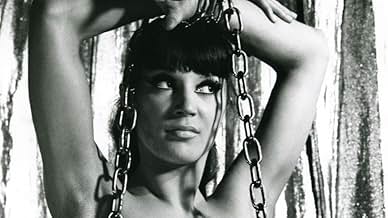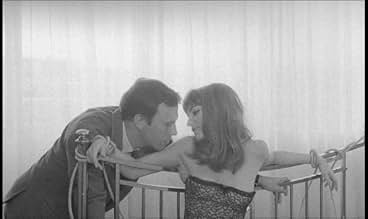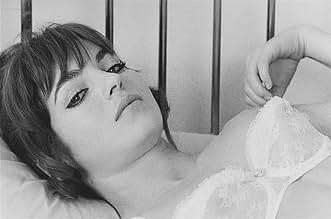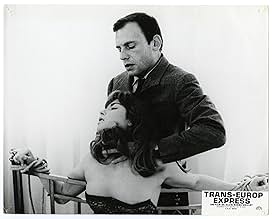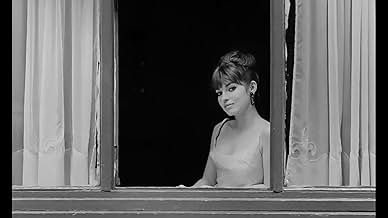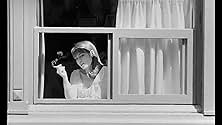Trans-Europ-Express
- 1966
- 1 h 45 min
AVALIAÇÃO DA IMDb
7,0/10
2,2 mil
SUA AVALIAÇÃO
Um produtor, diretor e assistente de cinema leva a Trans-Europ-Express de Paris a Antuérpia. Eles têm uma ideia para um filme sobre um traficante de drogas em seu trem e o visualizam enquant... Ler tudoUm produtor, diretor e assistente de cinema leva a Trans-Europ-Express de Paris a Antuérpia. Eles têm uma ideia para um filme sobre um traficante de drogas em seu trem e o visualizam enquanto filmam o roteiro.Um produtor, diretor e assistente de cinema leva a Trans-Europ-Express de Paris a Antuérpia. Eles têm uma ideia para um filme sobre um traficante de drogas em seu trem e o visualizam enquanto filmam o roteiro.
- Direção
- Roteirista
- Artistas
Gérard Palaprat
- Le Petit Mathieu
- (as Gerard Palaprat)
Clotilde Vanesco
- Cabaret Singer
- (as Clo Vanesco)
Jérôme Lindon
- Train traveller
- (não creditado)
Avaliações em destaque
As a big fan of Jean-Louis Trintignant, I couldn't really pass this up. Alain Robbe-Grillet is always bound to do something meta, so this could only be some sort of film about film, and it is. There is also a story, but the point seems to be to talk about the construction of stories. Definitely worth watching once.
Given that TRANS-EUROP-EXPRESS is the only movie directed by Alain Robbe-Grillet which the late conservative British film critic Leslie Halliwell reviewed in his celebrated “Film Guide”, one would think that it was more accessible than his usual reportedly impenetrable stuff and, in a way, it is – but still, the end result is hardly straightforward and almost as cerebral!
Jean-Louis Trintignant, in the first of four films he made with Robbe-Grillet, plays a novice drug courier tested by his future employers in carrying a stash of cocaine (which is actually sugar) by train and depositing it into a train station locker – but this simple task is fraught with any number of unexpected complications including police interrogation and night-time chases. Marie-France Pisier is a very beguiling presence here as a whore/double agent with whom Trintignant has several S&M encounters in a hotel room until her ‘double face’ drives him to murder…or does it? Although I was aware that the actress had played Colette in Francois Truffaut’s Antoine Doinel series and had the leading role in the trashy THE OTHER SIDE OF MIDNIGHT (1977), looking at her filmography just now I was surprised to learn that she was also in one of my favorite films, Luis Bunuel’s THE PHANTOM OF LIBERTY (1974), as well as Jacques Rivette’s ambitious fantasy CELINE AND JULIE GO BOATING (1974; which I’ve just acquired via the BFI’s 2-Disc edition)!
What this film has that the other Robbe-Grillet titles I’ve watched (including THE IMMORTAL ONE [1963]) don’t, is a surprisingly substantial dose of humor: in fact, the writer-director himself appears as a train passenger who is contemplating a film about drug-trafficking which (given that he happens to be on the train himself) would be an ideal vehicle for Jean-Louis Trintignant!; similarly, when Trintignant and Pisier go to a café he tells her that the waiter who had just served them was not a waiter at all but an actor playing a waiter!; during one of the various meetings with his shady employers, Trintignant is asked to repeat where he is supposed to meet his contact – implying a very complicated route – he simply replies “Where” (at which his employer doesn’t even bat an eyelid!), etc. At one point, Robbe-Grillet’s fellow passengers complain that drug-trafficking is no longer hip and that diamond-smuggling is the current criminal fad; therefore, Trintignant & Co. exchange costumes and settings accordingly…before the director decides to stick to his original idea (whim?) after all! Incidentally, this ‘screenplay-in-the-making’ structure reminds one of the contemporaneous Hollywood comedy, Paris WHEN IT SIZZLES (1964), which was itself a remake of an earlier French original – Julien Duvivier’s LA FETE A' HENRIETTE (1952). In fact, the whole self-referential element in the film and its heady spoof on the thriller genre recalls the Jean-Luc Godard of BREATHLESS (1960), BAND OF OUTSIDERS (1964), ALPHAVILLE (1965) and PIERROT LE FOU (1965) more than anything else...
Unfortunately, what I said about the poor video quality of EDEN AND AFTER (1970) applies to an even greater extent here – since this one looked distinctly like a tenth-generation dupe (with actors’ features being quite blurred at times and especially, alas, during the S&M striptease act towards the end). That said, the film itself is let down somewhat by sluggish pacing – even if the version I watched ran for a mere 88 minutes, when all sources I know of give its running-time as 105! As it is, I’d welcome a legitimate DVD release of TRANS-EUROP-EXPRESS and one hopes that the recent passing of its creator will inspire adventurous labels to pursue its rights.
Jean-Louis Trintignant, in the first of four films he made with Robbe-Grillet, plays a novice drug courier tested by his future employers in carrying a stash of cocaine (which is actually sugar) by train and depositing it into a train station locker – but this simple task is fraught with any number of unexpected complications including police interrogation and night-time chases. Marie-France Pisier is a very beguiling presence here as a whore/double agent with whom Trintignant has several S&M encounters in a hotel room until her ‘double face’ drives him to murder…or does it? Although I was aware that the actress had played Colette in Francois Truffaut’s Antoine Doinel series and had the leading role in the trashy THE OTHER SIDE OF MIDNIGHT (1977), looking at her filmography just now I was surprised to learn that she was also in one of my favorite films, Luis Bunuel’s THE PHANTOM OF LIBERTY (1974), as well as Jacques Rivette’s ambitious fantasy CELINE AND JULIE GO BOATING (1974; which I’ve just acquired via the BFI’s 2-Disc edition)!
What this film has that the other Robbe-Grillet titles I’ve watched (including THE IMMORTAL ONE [1963]) don’t, is a surprisingly substantial dose of humor: in fact, the writer-director himself appears as a train passenger who is contemplating a film about drug-trafficking which (given that he happens to be on the train himself) would be an ideal vehicle for Jean-Louis Trintignant!; similarly, when Trintignant and Pisier go to a café he tells her that the waiter who had just served them was not a waiter at all but an actor playing a waiter!; during one of the various meetings with his shady employers, Trintignant is asked to repeat where he is supposed to meet his contact – implying a very complicated route – he simply replies “Where” (at which his employer doesn’t even bat an eyelid!), etc. At one point, Robbe-Grillet’s fellow passengers complain that drug-trafficking is no longer hip and that diamond-smuggling is the current criminal fad; therefore, Trintignant & Co. exchange costumes and settings accordingly…before the director decides to stick to his original idea (whim?) after all! Incidentally, this ‘screenplay-in-the-making’ structure reminds one of the contemporaneous Hollywood comedy, Paris WHEN IT SIZZLES (1964), which was itself a remake of an earlier French original – Julien Duvivier’s LA FETE A' HENRIETTE (1952). In fact, the whole self-referential element in the film and its heady spoof on the thriller genre recalls the Jean-Luc Godard of BREATHLESS (1960), BAND OF OUTSIDERS (1964), ALPHAVILLE (1965) and PIERROT LE FOU (1965) more than anything else...
Unfortunately, what I said about the poor video quality of EDEN AND AFTER (1970) applies to an even greater extent here – since this one looked distinctly like a tenth-generation dupe (with actors’ features being quite blurred at times and especially, alas, during the S&M striptease act towards the end). That said, the film itself is let down somewhat by sluggish pacing – even if the version I watched ran for a mere 88 minutes, when all sources I know of give its running-time as 105! As it is, I’d welcome a legitimate DVD release of TRANS-EUROP-EXPRESS and one hopes that the recent passing of its creator will inspire adventurous labels to pursue its rights.
10cbreyno
This film is a beautifully done story within a story --- film within a film. The author and friends take a train ride and begin to work out a film; its plot, its characters and their actions. As the story evolves the characters take on their own existence, reality becomes inverted; they weave their own story as author becomes audience.
It is a taste of the 1960's thinking of the Michael Caine foreign intrigue films, The Orient Express not to mention the Manchurian Candidate. In a way it thumbs its nose at the genre.
I saw it when it ran almost forty years ago and enjoyed it immensely. If you can find it --- check it out.
It is a taste of the 1960's thinking of the Michael Caine foreign intrigue films, The Orient Express not to mention the Manchurian Candidate. In a way it thumbs its nose at the genre.
I saw it when it ran almost forty years ago and enjoyed it immensely. If you can find it --- check it out.
On board the TEE is 'Elias' (Jean-Louis Trintignant), a paranoid drug dealer on his way from Paris to Antwerp. And in another compartment are his creators; film-makers having a script meeting from which Elias emerges. It's a typical Robbe-Grillet construct, honed from nouveau roman experiments. The purpose of which, as he puts it, is to "assist change by throwing out any techniques which try to impose order or a particular interpretation on events". The result in this case is a parallel universe, on one hand Elias trying to act like a drug dealer and on the other, proceeding according to the whims of his creators. In effect, it becomes a real-time replay of the writing and editing process,
There are those who might regard this as typical French pretension, full of intellectual conceit (it was banned in England for many years), but it's playful, witty and very accessible thanks to a droll script and the great Jean-Louis. And then there's the beautiful Marie-France Pisier with her large inquisitive eyes. She makes an unlikely hooker, but is she? The scriptwriter on the train is played by Robbe-Grillet himself and so establishing that he really is making it up as he goes along. It's beautifully shot in crisp b&w, perfectly capturing the zeitgeist. It would be another twelve years before Kraftwerk created their musical homage to the great train, but it says something about both forms that it would have made the perfect soundtrack.
There are those who might regard this as typical French pretension, full of intellectual conceit (it was banned in England for many years), but it's playful, witty and very accessible thanks to a droll script and the great Jean-Louis. And then there's the beautiful Marie-France Pisier with her large inquisitive eyes. She makes an unlikely hooker, but is she? The scriptwriter on the train is played by Robbe-Grillet himself and so establishing that he really is making it up as he goes along. It's beautifully shot in crisp b&w, perfectly capturing the zeitgeist. It would be another twelve years before Kraftwerk created their musical homage to the great train, but it says something about both forms that it would have made the perfect soundtrack.
Trans-Europ-Express (1966) was written and directed by Alain Robbe-Grillet.
The plot of the movie is that a producer, director, and assistant are traveling from Paris to Antwerp. On the train, they amuse themselves by inventing a movie that would start off on a train from Paris to Antwerp, and continue from that point.
The movie we see is the movie they are inventing as they travel. Jean-Louis Trintignant stars in this invented movie. As always, he has one expression--blank.
The incomparable Marie-France Pisier stars in the movie as well. Apparently, no one had to work very hard to convince Marie-France to appear topless or participate in B&D. (Of course, we are expected to accept this, because this wasn't a real movie. It was just a movie that was being invented on a train.)
The concept was interesting, but too much of it was actually about drug drops, keys to lockers in train stations, etc. Granted, it was interspersed with visually more interesting scenes, but it really wasn't a great movie.
Trans-Europ-Express has a decent IMDb rating of 7.1. I didn't think it was that good, and rated it 6.
The plot of the movie is that a producer, director, and assistant are traveling from Paris to Antwerp. On the train, they amuse themselves by inventing a movie that would start off on a train from Paris to Antwerp, and continue from that point.
The movie we see is the movie they are inventing as they travel. Jean-Louis Trintignant stars in this invented movie. As always, he has one expression--blank.
The incomparable Marie-France Pisier stars in the movie as well. Apparently, no one had to work very hard to convince Marie-France to appear topless or participate in B&D. (Of course, we are expected to accept this, because this wasn't a real movie. It was just a movie that was being invented on a train.)
The concept was interesting, but too much of it was actually about drug drops, keys to lockers in train stations, etc. Granted, it was interspersed with visually more interesting scenes, but it really wasn't a great movie.
Trans-Europ-Express has a decent IMDb rating of 7.1. I didn't think it was that good, and rated it 6.
Você sabia?
- CuriosidadesThis film was banned for a time by the British Censor because of its depiction of sexual bondage (which is now regarded as very tame). However, the ban was lifted at around the end of the 1960s.
- ConexõesReferences Moscou Contra 007 (1963)
- Trilhas sonorasLa Traviata
Principais escolhas
Faça login para avaliar e ver a lista de recomendações personalizadas
- How long is Trans-Europ-Express?Fornecido pela Alexa
Detalhes
- Data de lançamento
- Países de origem
- Idiomas
- Também conhecido como
- Транс'європейський експрес
- Locações de filme
- Central Station, Antwerp, Flanders, Bélgica(railway station)
- Empresas de produção
- Consulte mais créditos da empresa na IMDbPro
- Tempo de duração
- 1 h 45 min(105 min)
- Cor
- Mixagem de som
- Proporção
- 1.66 : 1
Contribua para esta página
Sugerir uma alteração ou adicionar conteúdo ausente


